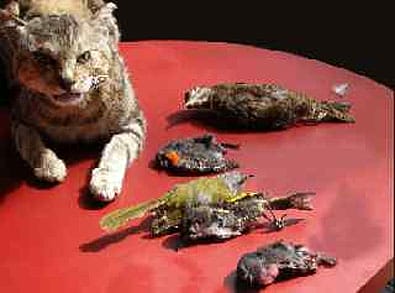TNR for Feral Cats is Horribly Cruel and Only Makes People Feel Better

Manqsquan, NJ – -(AmmoLand.com)- There has been much made of the supposed “Positive Results” of Trap Neuter and Release (TNR). What proponents fail to mention is that Feral Cats are not outside pets and suffer horribly from the lack of food, water, shelter and regular medical care while living outside exposed to the elements.
The number of feral cats suffering under the guise of TNR is staggering. It is estimated that the township of Jackson, NJ has 1000+ feral cats, while Point Pleasant Beach NJ Animal Welfare Committee estimates there are some 200 -300 feral cats in Pt Beach, NJ alone.
The popularity of TNR programs has been put forward as an acceptable solution by animal rights extremist organizations.
Under the guidance of radical NO-Kill groups, whose admitted goal is equal rights for animal and humans, they have been promoting TNR as a way to prevent the euthanization of cats and pushing forward their “Feel Good” policy of keeping animals alive at all cost.
Feral Cats Are an Invasive Species:
Feral Cats are so damaging to the environment that the Global Invasive Species Database lists Feral Cats as number 38 out of 100 of the World’s Worst Invasive Alien Species. More dangerous than Fire Ants (86), Rats (80) and Killer Bees. Would you Trap Neuter and Release rats or killer bees and they are consider less of an environmental threat?
The domestic cat hunts and eats over a thousand species. Even well-fed domestic cats may hunt and kill, mainly catching small mammals, but also birds, amphibians, reptiles and fish. Hunting by domestic cats is the leading cause of the decline in the numbers of birds in urban areas.
Yet under TNR cats are trapped, then provided with medical care and food in warm clean environment. Once they are judged to be healthy their ears are clipped, to identify them as being previously trapped, and they are released back into your local back yard cat colony.
Feral Cats Spread Rabies:
In recent weeks there has been a dramatic upswing in the incident of rabies in local wild animals. Many times the vector source of the spread of rabies is established cat colonies as evidenced by the recent warnings by Point Pleasant Beach’s animal control officer and the suspension of their much touted TNR program. This close proximity of rabid feral cats, living on our beaches and in our parks, exposes natural wildlife and all of us to increased risk of rabies and other serious diseases. Oh, did I mention that with the current suspension there is no trapping of feral cats so rabid cats are left to infect more animals and possibly humans, while they suffer the maddening consequences of rabies and die alone in the wild?
Feral Cats in the Wild is Animal Cruelty:
Domestic cats left in the wild even with “animal sponsors” suffer from horrible conditions. Cats are territorial so when a new cat is trapped under TNR and its brief vacation in a loving animal shelter is over it is released in the local “Cat Colony” where it must now fight for its life with established feral cats for food, water and territory. Not to mention the cold, heat, rain, fleas, tics, parasites, automobile traffic and encounters with indigenous wild animals that this frightened house hold pet must endure just so individuals can feel good about not having had to euthanize this poor creature.
A Better Solution:
A Better Solution would be towns taking responsible steps to reduce the chance of domestic cats escaping or breeding in the wild followed with a comprehensive Trap and Keep policy.
All towns should pass ordinances so domestic cats are licensed the same as dogs, and like dogs, the ordinance should read that cats can not be allowed outside without a leash. All the same fines and penalties for dog owners should apply to cat owners found letting their cat run free or unlicensed. This would reduce the negative effects that household pet cats have on wildlife and would greatly reduce the chances of them breeding with each other and with feral cats in the wild.
In fact this solution is the preferred choice of the following organizations over TNR.
• American Bird Conservancy
• Humane Society Of The United States (HSUS)
• Audubon Society
• Bird Conservation Alliance
• People for the Ethical Treatment of Animals (PETA)
Lastly existing wild cats and cat colonies should be trapped, rehabilitated and adopted out or euthanized. Money raised from the cat licensing process should be used to fund the Trap and Remove Program.
The No-Kill animal organizations will disagree and fight these common sense ideas tooth and nail even if it means these poor cats will continue to suffer.
So that leaves level headed town residents to be the ones to ask their Mayor and Councils to end this cruel and inhumane practice of Trap, Neuter and Release. This is a hard step but the best one for animals and one that responsible animal lovers should do for unfortunate animals in bad situations.
